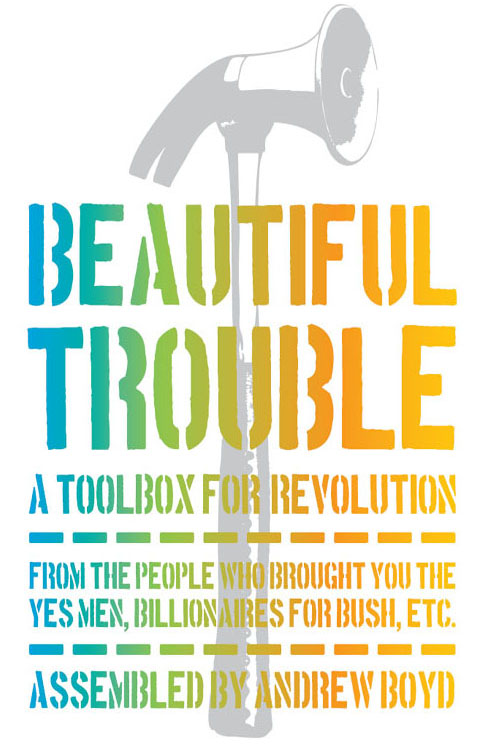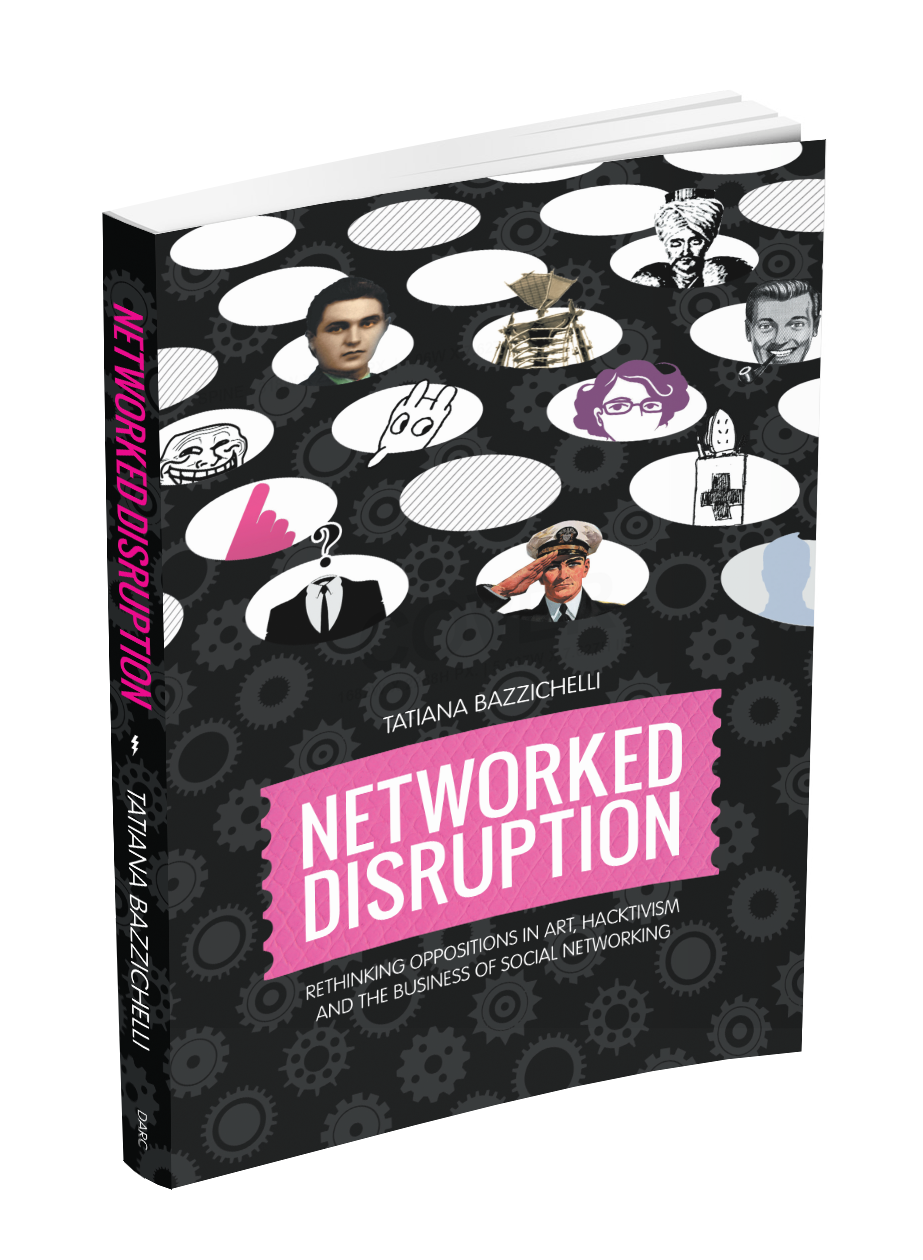Andrew Boyd (ed.): Beautiful Trouble: A Toolbox for Revolution (2012)
Filed under book | Tags: · activism, art, debt, hacking, occupy movement, politics, protest, revolution, self-organization, social movements, tactical media, theory

“From Cairo to cyberspace, from Main Street to Wall Street, today’s social movements have a creative new edge that’s blurring the boundaries between artist and activist, hacker and dreamer. But the principles that make for successful creative action rarely get hashed out or written down.
Until now.
Beautiful Trouble brings together ten grassroots groups and dozens of seasoned artists and activists from around the world to distill their best practices into a toolbox for creative action. Among the groups included are Agit-Pop/The Other 98%, The Yes Men/Yes Labs, Code Pink, SmartMeme, The Ruckus Society, Beyond the Choir, The Center for Artistic Activism, Waging Nonviolence, Alliance of Community Trainers and Nonviolence International.”
Contributors include Rae Abileah, Ryan Acuff, Celia Alario, Phil Aroneanu, Peter Barnes, Jesse Barron, Andy Bichlbaum, Nadine Bloch, Kathryn Blume, L.M. Bogad, Josh Bolotsky, Mike Bonanno, Andrew Boyd, Kevin Buckland, Margaret Campbell, Doyle Canning, Samantha Corbin, Yutaka Dirks, Steve Duncombe, Mark Engler, Simon Enoch, Jodie Evans, John Ewing, Brian Fairbanks, Bryan Farrell, Janice Fine, Lisa Fithian, Cristian Fleming, Elisabeth Ginsberg, Stan Goff, Arun Gupta, Silas Harrebye, Judith Helfand, Daniel Hunter, Sarah Jaffe, John Jordan, Dmytri Kleiner, Sally Kohn, Steve Lambert, Anna Lee, Stephen Lerner, Zack Malitz, Nancy Mancias, Duncan Meisel, Matt Meyer, Dave Oswald Mitchell, Tracey Mitchell, George Monbiot, Brad Newsham, Gaby Pacheco, Mark Read, Patrick Reinsborough, Simon Roel, Joshua Kahn Russell, Leonidas Martin Saura, Levana Saxon, Maxine Schoefer-Wulf, Nathan Schneider, Kristen Ess Schurr, John Sellers, Rajni Shah, Brooke Singer, Matt Skomarovsky, Andrew Slack, Phillip Smith, Jonathan Matthew Smucker, Starhawk, Eric Stoner, Jeremy Varon, Virginia Vitzthum, Harsha Walia, Jefferey Webber and the Coalition of Immokalee Workers.
Assembled with Dave Oswald Mitchell
Publisher OR Books, New York/London, June 2012
Creative Commons Attribution-NonCommercial-ShareAlike 3.0 Unported License
ISBN 9781935928577
474 pages
Book website
Kickstarter page
Editor
Publisher
PDF (updated on 2024-2-18)
EPUB (added on 2024-2-18)
HTML
Peter Krapp: Noise Channels: Glitch and Error in Digital Culture (2011)
Filed under book | Tags: · digital culture, electronic music, error, gaming, glitch, hacktivism, hypertext, machinima, media history, noise, sound art, tactical media, video games

Brings to light the critical role of noise and error in the creative potential of digital culture.
To err is human; to err in digital culture is design. In the glitches, inefficiencies, and errors that ergonomics and usability engineering strive to surmount, Peter Krapp identifies creative reservoirs of computer-mediated interaction. Throughout new media cultures, he traces a resistance to the heritage of motion studies, ergonomics, and efficiency, showing how creativity is stirred within the networks of digital culture.
Noise Channels offers a fresh look at hypertext and tactical media, tunes into laptop music, and situates the emergent forms of computer gaming and machinima in media history. Krapp analyzes text, image, sound, virtual spaces, and gestures in noisy channels of computer-mediated communication that seek to embrace—rather than overcome—the limitations and misfires of computing. Equally at home with online literature, the visual tactics of hacktivism, the recuperation of glitches in sound art, electronica, and videogames, or machinima as an emerging media practice, he explores distinctions between noise and information, and how games pivot on errors at the human–computer interface.
Grounding the digital humanities in the conditions of possibility of computing culture, Krapp puts forth his insight on the critical role of information in the creative process.
Publisher University of Minnesota Press, 2011
Volume 37 van Electronic Mediations
ISBN 0816676240, 9780816676248
216 pages
Download (removed on 2012-6-30 upon request of the Digital Assets Coordinator of the University of Minnesota Press)
Tatiana Bazzichelli: Networked Disruption: Rethinking Oppositions in Art, Hacktivism and the Business of Social Networking (2011)
Filed under thesis | Tags: · art, hacktivism, mail art, neoism, networks, social media, tactical media, web, web 2.0

“The objective of this research is to rethink the meaning of critical and oppositional practices in art, hacktivism and the business of social networking. The aim is to analyse hacker and artistic practices through business instead of in opposition to it. By identifying the emerging contradictions within the current economical and political framework of Web 2.0, my aim is to reflect on the status of activist and hacker practices as well as those of artists in the new generation of social media (or so called Web 2.0 technologies), analysing the interferences between networking participation and disruptive business innovation.” (author)
PhD Dissertation
Department of Information and Media Studies, Aarhus University, December 2011
Supervisor: Søren Pold, Department of Information and Media Studies, Aarhus University
Co-supervisor: Fred Turner, Communication Department, Stanford University, California
Peer Production License
272 pages
PDF (4 MB, updated on 2016-2-17)
See also Networked Disruption exhibition catalogue, 2015.
Comment (0)
